Undergrad’s hometown in ashes: ‘It truly was a paradise’
Elisabeth Earley's family home, barn and orchard were destroyed when the Camp Fire roared through Butte County — her family escaped
November 14, 2018
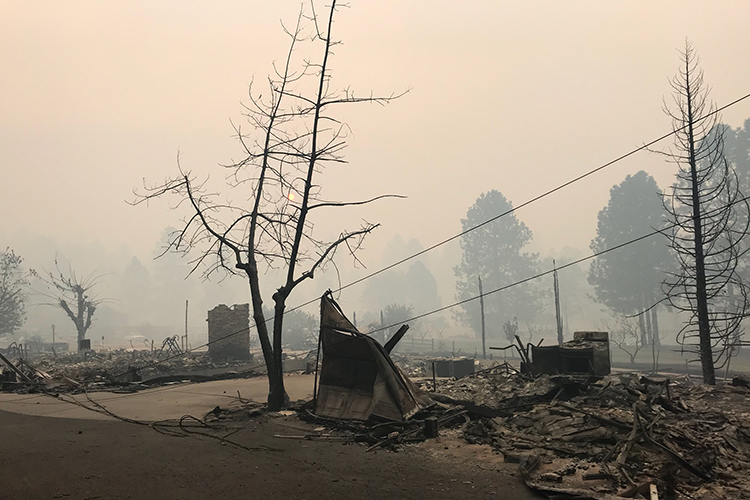
Like so many residents of Paradise, the Earley family lost its property — a house, barn, garage and orchard — to the Camp Fire. (Photo courtesy of Ashley Estep-Earley)
The name of Elisabeth Earley’s hometown is Paradise, and to top it off, she and her family lived on Lovely Lane. Their 10-acre property was just that, lovely, with its cream-colored house and red barn, grazing sheep and lambs, pond filled with koi and endless apple orchard.
It also was a popular stop for friends and neighbors who’d arrive, often unannounced, to help collect eggs from the chickens, do art projects or play darts or pool in the barn, enjoy a beer and a chat or join in hosing down pigs or checking the beehives.
“My parents held a going-away party for me there last summer,” said Earley, a 21-year-old UC Berkeley senior, in a phone interview on Wednesday. Earley is in Santiago, Chile, this semester with the UC Education Abroad Program.
“It was a celebratory place. A farm, but also a haven,” added Isabel Emmons, 21, a childhood friend of Earley’s who also attends Berkeley. She recalled adding her name and handprint to a wall in the so-called “Art Barn,” where Earley family friends have left their mark for more than a decade.
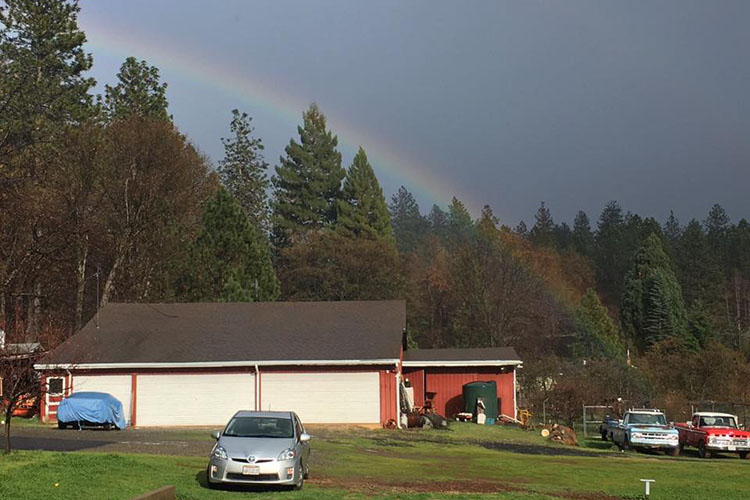
The Earley family’s barn was known as the Art Barn, a gathering spot for friends and family to do art projects and play games. (Photo by Elisabeth Earley)
“Now,” said Emmons, who grew up in nearby Magalia, “most of those people’s houses are gone.”
And so is the Earleys’ property. The sheep and lambs are all that remain on a smoky landscape of ashes, rubble and twisted metal. Earley’s mother, father, brother, three dogs and paternal grandparents, who lived nearby, escaped.
“My brother and I had lived there our whole lives,” said Earley of her family home and beloved Sierra foothills town. “Nothing will be the same, for sure.”
As of 7 p.m. Wednesday, Cal Fire reported that the Northern California Camp Fire — the deadliest in state history — so far had burned 138,000 acres, destroyed 8,650 single-family homes, killed 56 people and was 35 percent contained. Nearly 300 people, most of them from Paradise, population 26,000, are on the Camp Fire missing persons list maintained by the Butte County Sheriff’s Office. The cause of the fire, which began last Thursday, is under investigation.
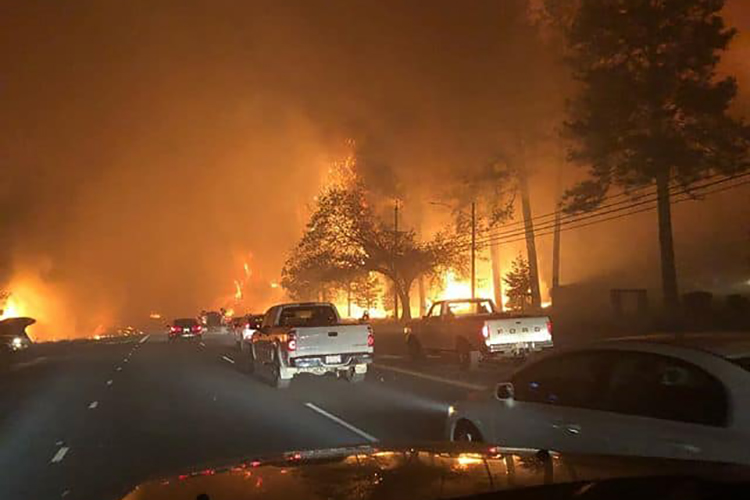
A photo taken by a Paradise resident fleeing the fast-encroaching fire.
Safe in Chile
Earley, a political science and Latin American literature major, described being in a good mood last Thursday after class at the Catholic University of Chile and intentionally off the electronic grid, ignoring her cell phone and social media. But along came an urgent text from Emmons.
“She said apparently there was a fire where we live, and people were being evacuated. She asked if I’d heard from my family,” said Earley. “We’d had evacuations before in Paradise, so I just told her, “’Oh, thanks.’”
Even when Earley’s mom texted her that it was time to flee the farm and included a video that “looked like the sky was on fire, hazy, I wasn’t worried,” she said.
But later, when cell phone signals cut out in the Paradise area and she couldn’t text anyone, Earley was forced to watch the horror unfold on social media and to worry about her loved ones’ whereabouts. Fortunately, her father, mother and brother wound up with her maternal grandmother in Fort Bragg, while her father’s parents went to stay with friends in Chico.
Earley asked her parents if she should leave Chile and fly back to California, but “they found it most comforting to know that I was in Chile and safe, and that I had a room and a bed and friends around me,” she said. “That made them feel grateful.”
More than 6,000 miles from home, Earley posted on Facebook several photos of her family’s property, before and after. “I’ve been so incredibly lucky to grow up in this beautiful place and to make so many memories with my friends and family here,” she wrote. “It truly was a paradise.”
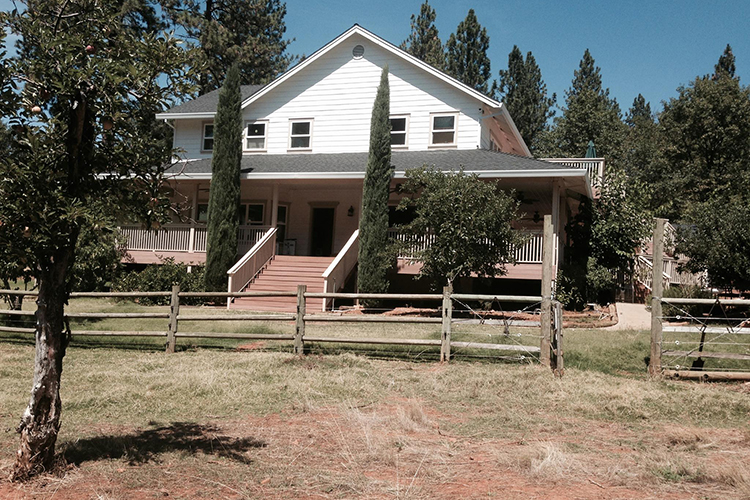
The Earleys’ house, before the fire. (Photo by Ashley Estep-Earley)
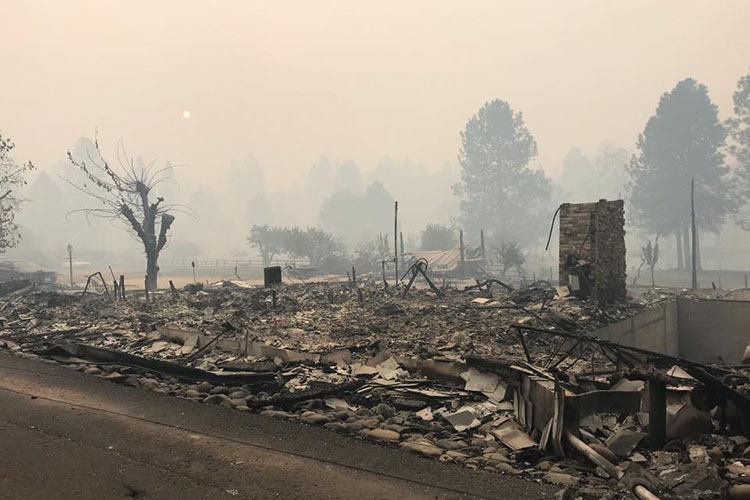
All that’s left of the Earleys’ home. (Photo courtesy of Ashley Estep-Earley)
Meanwhile on Thursday, just as her 8 a.m. class at Berkeley was ending, Emmons learned her father was escaping Magalia with their two dogs, dog supplies, a bag of clothes and important documents. His wife was at a conference in Menlo Park.
“It took him six hours instead of 20 minutes to get to Chico,” said Emmons, a senior majoring in interdisciplinary studies, specifically the science, cultivation and practice of human happiness. Today, her parents are in the Bay Area, unsure of their home’s status and not allowed to check on it.
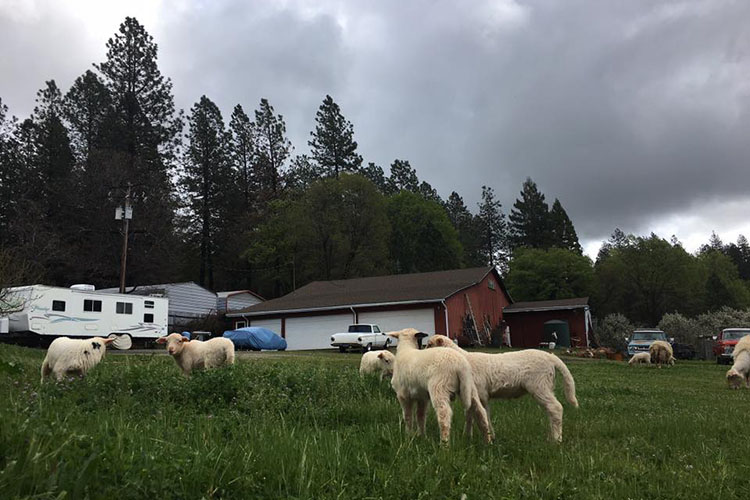
The Earleys’ animals survived the fire. The sheep, shown here by the barn before the fire, were found grazing on a patch of grass nearby. (Photo by Elisabeth Earley)
‘In a liminal space’
If Earley had been home when her family fled, she said she would have saved some of her favorite things — her journals, the soccer jerseys and T-shirts she might have turned into a quilt and Blue Guy, the stuffed bear with the cut-off ears that she rescued from a thrift shop.
“I took Blue Guy to Berkeley and put him in my dorm room. And when I left for Chile, I put him on my bed in Paradise and thought it would be so nice that he’d be waiting there for me,” she said. “I got him in the third or fourth grade. I loved him so much, and I never had been the type to get attached to stuffed animals.”
She’d also been excited about Berkeley’s upcoming winter break and her three-and-a-half-hour drive home to Butte County “through farms and forests, the anticipation building to getting home, feeling the fresh air, looking at the night sky and seeing every star,” she said. “It just refreshes your soul.”
While back in Paradise, Earley planned to “walk from my house to my best friend’s grandma’s house and go on a run around town and see everything, buy some Oreos from Safeway, walk back to her grandma’s and put on a superhero movie and do what we always do — relax and have fun.”
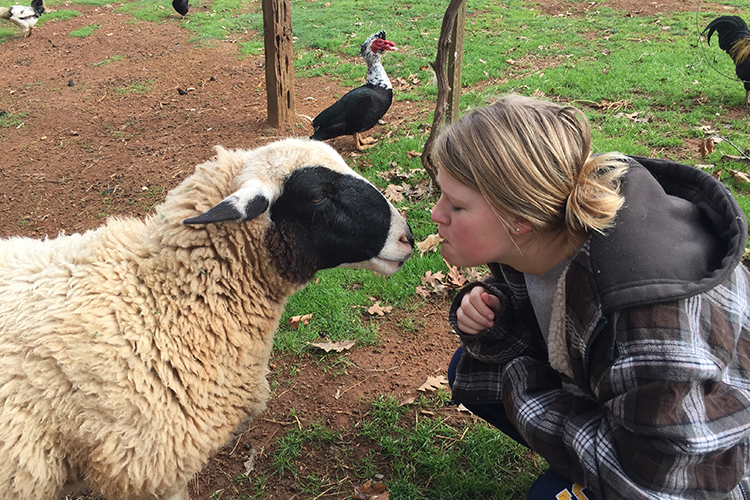
A visit in earlier times between Elisabeth Earley and one of the family’s sheep. (Photo by Ashley Estep-Earley)
Now, there isn’t a town anymore. “Even if some people’s houses survived, there is nothing to go back to. It’s not even habitable,” said Earley. “There is no running water, no electricity. The schools are destroyed, there are no teachers to teach, no kids to be taught. There are no jobs anymore. You can’t drive the roads. I don’t know how many years it takes to rebuild a town.”
Emmons said she realizes “we’re very lucky, all of us, because we’ve had fire dance around us in the past, and we thought it would move elsewhere before it got us again. We overestimated the power of dry heat.”
But she described feeling like she’s “in a liminal space,” a waiting area between one point in time and space, and the next.
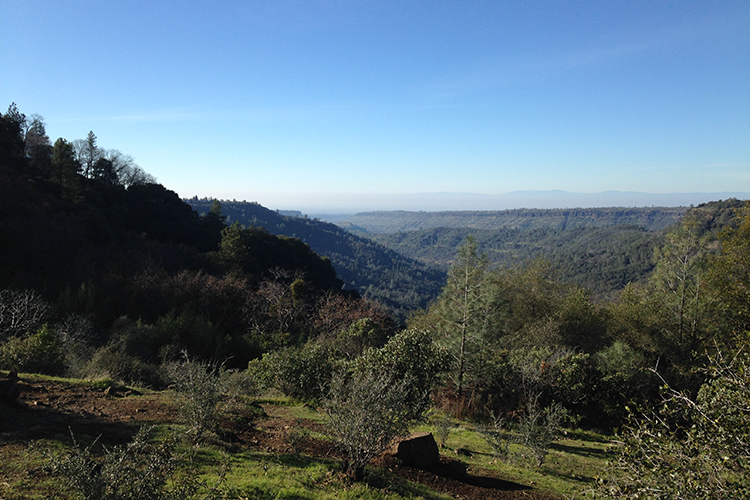
Before the fire, a stunning view of Butte Creek Canyon in Paradise. (Photo by Elisabeth Earley)
One thing Earley knows for sure is that she hasn’t seen the last of Lovely Lane. Her parents put heart and soul into their property — building onto an older house that once had belonged to an elderly man, adding the pond and “quite the list of animals, even a llama,” she said. So, even if they relocate, perhaps to Chico, Earley added, “I think they’ll use what’s left and try to build something for when they want to get away from the city — a place to bring our friends and have our parties.”
NOTE: Last Friday, email was sent to UC Berkeley students in areas affected by the Camp, Woolsey and other California fires by Joseph Greenwell, associate vice chancellor and dean of students, directing them to campus resources that offer general, mental health, financial and student legal services support.
A day earlier, University Health Services (UHS) warned members of the campus community in a campus-wide email about the health effects of smoke from the Northern California fires. It urged those impacted by the smoke to monitor the current and forecasted Air Quality index and to read the health advisory on the UHS website.